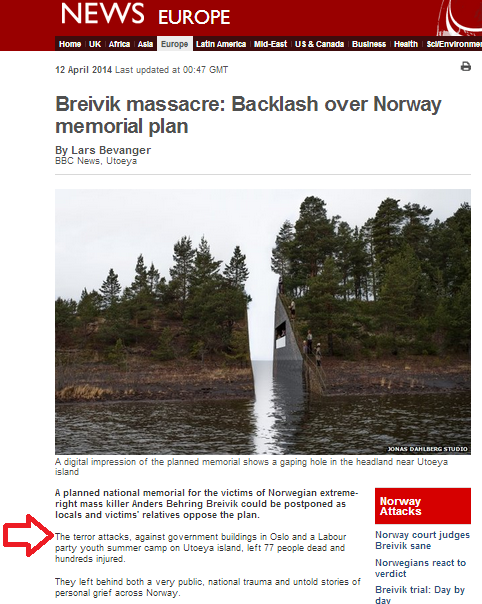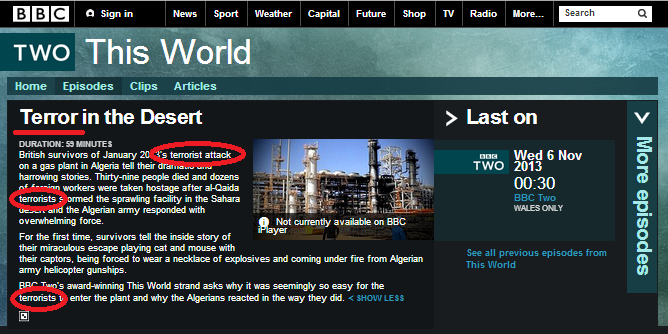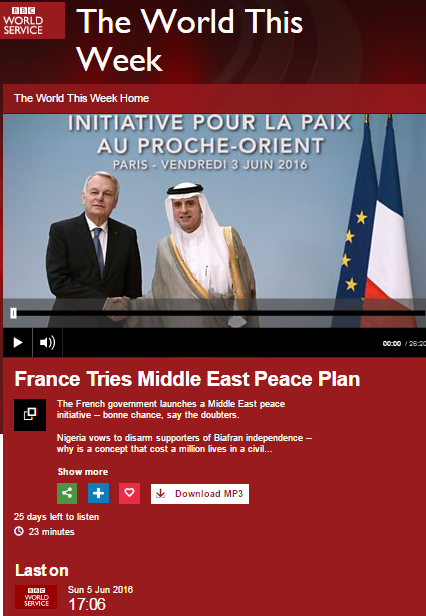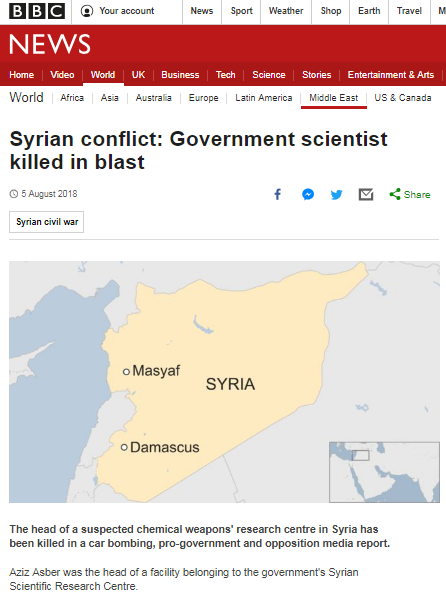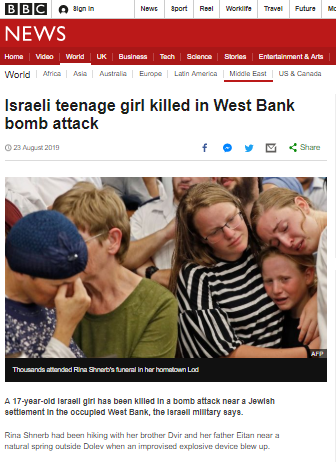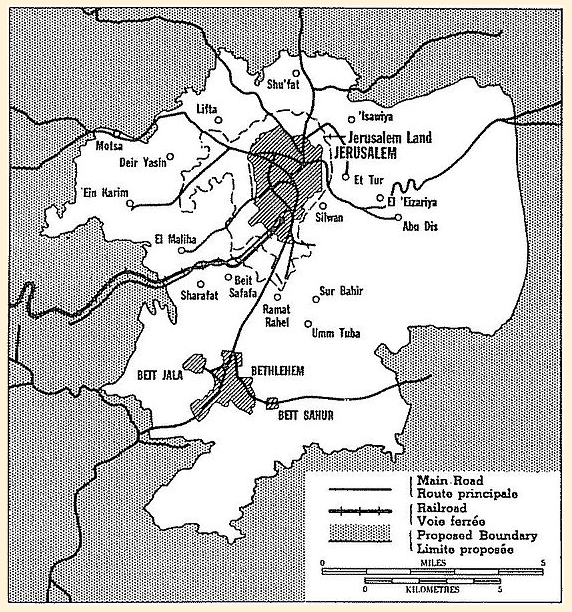As we well know, the BBC’s use of the word terror and its derivatives is highly inconsistent (and has been for many years) – as it stated itself last year in a reply to a complaint from a member of the public.
“The BBC has specific guidelines on this that do not proscribe use of the term but advise editors to consider the particular circumstances. It has never been outlawed by the whole of BBC News and so there’s little we can usefully add to your comparison, which involves citing one specific story in comparison with the BBC’s Middle East coverage more generally, despite their clear differences, in your belief that our approach is inconsistent.
We can only reiterate that there is no general approach and decisions are taken on a case-by-case basis.” [emphasis added]
In previous posts we have noted here that terrorism can apparently be named as such by the BBC in Great Britain and Northern Ireland as well as in Spain. Three more recent BBC reports show that according to the BBC, terrorism also happens in Norway and in the United States and that “terrorism messages” can be sent in the Netherlands.
In Kenya and in some parts of the Middle East, however, different standards have been shown to prevail, with use of the word terror or its variations more often than not presented in deliberately distancing punctuation or as a quotation and consistent adoption of euphemistic terms such as “militants”.
The BBC’s guidance on “Language when Reporting Terrorism” seems to contradict the above response to a complaint: [emphasis added]
“Our policy is about achieving consistency and accuracy in our journalism. We recognise the existence and the reality of terrorism – at this point in the twenty first century we could hardly do otherwise. Moreover, we don’t change the word “terrorist” when quoting other people, but we try to avoid the word ourselves; not because we are morally neutral towards terrorism, nor because we have any sympathy for the perpetrators of the inhuman atrocities which all too often we have to report, but because terrorism is a difficult and emotive subject with significant political overtones.
We also need to ensure that when we report acts of terror, we do so consistently in the stories we report across our services. We have learnt from the experience of covering such events in Northern Ireland as much as in Israel, Spain, Russia, Southern Africa or the many other places where violence divides communities, and where we seek to be seen as objective by all sides, that labels applied to groups can sometimes hinder rather than help.”
Clearly, as the examples above indicate, that aspiration for consistency is not being achieved. The apparent reason for that can – ironically – be presumed to lie in another section of those same guidelines.
“The value judgements frequently implicit in the use of the words “terrorist” or “terrorist group” can create inconsistency in their use or, to audiences, raise doubts about our impartiality. [….]
We also need to ask ourselves whether by using “terrorist” we are taking a political position, or certainly one that may be seen as such.”
As has been posited here before, the BBC’s avoidance of use of the word terror in certain definable geographic areas is just as much a “value judgement” and a statement of a “political position” as is its employment in stories which take place elsewhere.
If shooting attacks by a far-right extremist in Norway justifiably get the editorial thumbs-up for description as “terror attacks” and “terrorist activity” is used to describe the actions of members of an armed group in Northern Ireland, then it is difficult to conceive of any motivation for the markedly different description of similar attacks or activities elsewhere which does not stem from a political position regarding the perpetrators – or their victims.
A particularly interesting case study is that of the January 2013 attacks on the Amenas gas plant in Algeria. BBC coverage at the time was criticized in the UK Parliament for its choice of wording.
“The Prime Minister said the attack that killed six Britons should be “condemned utterly” after a Conservative MP expressed “surprise and disappointment” at the broadcaster’s reporting.
The BBC, which has strict guidelines for reporters on the terms they should adopt, described the attackers as “militants” 12 times in one report on its website.
However, in the same report, the only use of the term “terrorists” occurred in a quotation from remarks by the Algerian prime minister.
During a debate on the hostage crisis in the Commons, Andrew Bridgen the Conservative MP for North West Leicestershire, asked the Prime Minister: “Are you as surprised and disappointed as I am that the BBC have consistently described the perpetrators of these heinous crimes as militants rather than the terrorists which they are?”
Mr Cameron said his colleague had made a “good point” adding: “These are terrorists and they should be described as such.
“This was a terrorist attack, it was to take hostages, to kill them, to kill innocent people and it should be condemned utterly.” “
Notably, later BBC reporting on the incident showed a reversal of policy. An edition of the BBC Two programme ‘This World’ broadcast in August, September and November 2013 used the word terror in its title and in the programme synopsis.
An article which appeared in the magazine section of the BBC News website in August 2013 under the title “Algeria siege: ‘I wore a necklace bomb’” also did not shy away from clarifying to readers that the attackers were terrorists. The article opens:
“The survivors of January’s siege of an Algerian gas plant still cannot believe they are alive. Forty of their colleagues died when Islamic militants took them hostage. The Algerian army opened fire on the convoy of hostages and terrorists as they broke out of the plant. It is only now that some have felt able to tell their stories.
For BP team leader Lou Fear and his wife Lori at home in the UK, the morning of 16 January 2013 began as usual with a text message from Lou. But the content was anything but normal.
It told her terrorists were roaming around – the plant was under attack. Lou was barricaded in his office with some colleagues and hiding behind a filing cabinet. The militants were just outside.” [emphasis added]
Later it states:
“Three dozen terrorists from the Signed in Blood Battalion linked to al-Qaeda had taken Algerian military police, responsible for security, completely by surprise. First they attacked a bus carrying workers just outside the compound then broke into the plant itself.” [emphasis added]
In fact, the word ‘terrorists’ – or versions of it – appears some nineteen times in that article. Clearly the claim made in the BBC’s guidelines that “we try to avoid the word ourselves” because “terrorism is a difficult and emotive subject with significant political overtones” did not apply in this case.
Whether that shift in policy was the result of the previous criticism from parliamentary sources is unclear, but certainly the BBC should not be surprised when people in other countries raise concerns similar to those expressed in the British parliament.
The topic of the double standards displayed by the BBC’s selective and inconsistent use of the term terror is one well worth continued observation and mapping.

